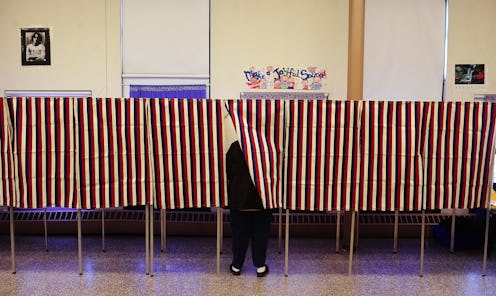News
Get Ready For Super Tuesday
Super Tuesday is a ubiquitous phrase at this point in the election cycle, and it's coming up just around the corner. Only the South Carolina Democratic primary and the Nevada Republican caucus separate the candidates from the biggest day in primary season, which promises to be an intense, exciting showdown within both parties. When is Super Tuesday? It's on March 1 this year, so set that alarm on your calendar app.
The term Super Tuesday has been used since at least 1976, and was initially created to detract from the retail politics that form in the early state primaries. "Super Tuesday was basically designed to nationalize the message, to try to reduce the influence of the so-called 'Iowa syndrome,'" former senator Chuck Todd told PBS Newshour back in 1988. By having primaries en masse, candidates could keep focused on issues that affect the whole country, rather than regionally specific issues. It's another reason a strong showing on Super Tuesday is so important for candidates — the outcomes are more likely to reflect the national attitude toward a candidate because they haven't been hardcore stumping through the state like in Iowa and New Hampshire.
Unlike Election Day in November, Super Tuesday isn't standardized for each election year, nor are the states who participate in Super Tuesday standardized. It typically falls either sometime in late February or early March, but because states decide when to hold their primaries individually, any Tuesday when a lot of primaries are scheduled can be Super. In 2008, Super Tuesday was officially on March 4, but 24 states held their primaries on February 5, creating a Super Tuesday I and a Super Tuesday II, which only had five elections and was significantly less super.
This year, several Southern states, including Texas, Alabama, and Georgia will vote on Super Tuesday, giving rise to the nickname "SEC primary." About 24 percent of the Republican delegates and 21 percent of the Democratic delegates will be awarded, the lion's share from Texas, for each party. In total, 10 states will vote for both parties, two states will have elections just for the Republicans, and American Samoa will caucus only for the Democrats.
If you're any kind of political junkie, you will definitely want to be following all the action on Super Tuesday. Sanders and Clinton are neck and neck, which is likely to change one way or the other on March 1, and Cruz could seriously change the game if the polls stick and he wins his home state. It's absolutely going to be an exciting night, so tune in next Tuesday to watch all the action.
